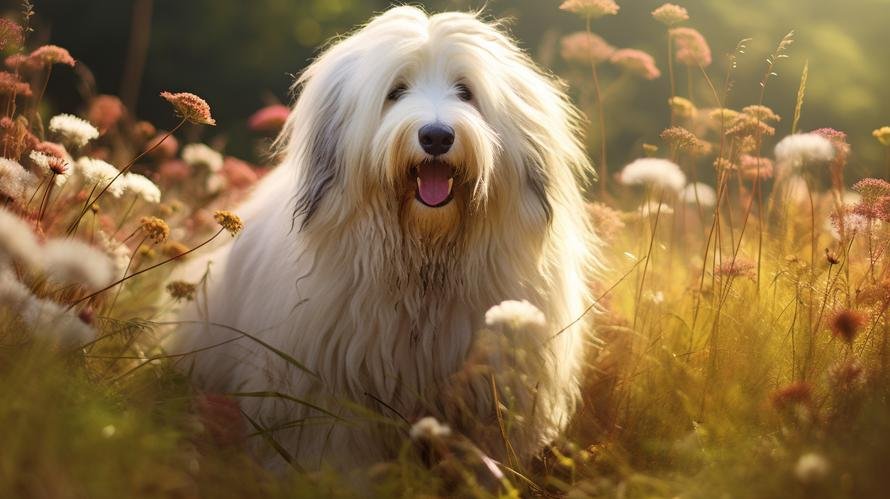When Sir Walter Scott penned the novel “The Talisman,” he perhaps unknowingly introduced one of the most beloved dog breeds, the Old English Sheepdog. Hidden amongst the numerous pages of this illustrious novel, existed a dog character named “Bevis”, whose personality traits closely matched those of an Old English Sheepdog. Known for its shaggy coat, symbolism of British heritage, and frequent appearances on screen and in literature, the Old English Sheepdog has, over time, captured hearts worldwide.
Now, as intrigued as you are by this breed, you’re possibly wondering, “Is an Old English Sheepdog aggressive?” Could a dog as fluffy and luxurious as this ever show signs of hostility? The answer, in short, is not quite as black and white, and with all things concerning temperament and behavior, a gray area should always exist.
A standard trait among Old English Sheepdogs is their inherently docile nature. They are known for their gentle disposition and their boisterous, comical sense of fun. These dogs possess an amusing streak, some referring to them as the ‘clown of the dog world’. They are patient, friendly, intelligent, and flexible, an admirable combination that makes them great companions for children and adults alike.
Although these traits are standard in every Old English Sheepdog, it doesn’t mean there can’t be exceptions. Like humans, each dog is unique. Their temperament, attitude, and behavior largely depend on their environment, upbringing, and training.
The key to understanding aggression is to differentiate between being protective and being aggressive. Every good dog is protective of its family. For the Old English Sheepdog, protecting their loved ones comes naturally. If they sense danger, their instinct is to alert their family members and stand guard to defend them. This reaction doesn’t necessarily mean they are aggressive. It simply shows their loyalty and their commitment to ensure the safety and wellbeing of those they care about.
Understandably, any form of aggression in dogs can be worrisome. But, it’s usually a reaction to a particular situation, rather than an inherent trait. For example, if an Old English Sheepdog is handled roughly or provoked continuously, it may respond negatively, which can be mistaken for aggression. Education and awareness about handling dogs can prevent such episodes.
One commonly misunderstood issue is the difference between aggressiveness and ‘heard dog behavior’. After all, Old English Sheepdogs originally bred to herd cattle and sheep might nip or poke to get their charges moving. While this behavior could be misunderstood as aggression, it’s merely a deep-seated instinct and part of their job description. Proper training can channel this behavior into a more acceptable form.
An excellent approach to prevent aggressive behavior is to socialize the dog from a young age. Frequent interactions with other dogs and humans help them get familiar with different experiences, nurturing their confidence, and reducing the chances of them exhibiting hostile behavior in new situations.
Training is essential, with positive reinforcement training proving to be most effective. Rewarding good behavior encourages the dog to repeat it, while negative behavior is ignored. Gradually, they learn to associate positive behavior with rewards, helping shape their temperament and behavior.
To sum it up, the Old English Sheepdog is generally not an aggressive breed. As loyal and affectionate companions, these dogs can bring a joyful and humorous spirit to your home. However, they need the right environment, training, and socialization to promote their most appealing traits. Remember, their behavior is a reflection of their environment and how they are treated.
It’s exciting to bring home a fluffy, energetic Old English Sheepdog. With a little bit of understanding, patience, and love, you can ensure that your canine companion grows up to be a loyal, friendly, and protective family member. So, go ahead and enjoy the delightful company of your Old English Sheepdog, and remember, they are just as unique as you are and that’s what makes them special.
In closing, when it comes to defining dogs as aggressive or mellow, it’s crucial to not solely rely on breed stereotypes. Instead, consider the individual dog’s personality, upbringing, and experiences. After all, dogs, like people, are shaped by a combination of nature and nurture. An Old English Sheepdog, given the proper care, can be a loving and protective addition to any household. So, instead of fretting if an Old English Sheepdog is aggressive, bask in the joy of understanding their unique traits, their loyalty, their protective nature, and above all, their capacity to fill our lives with love and laughter.



